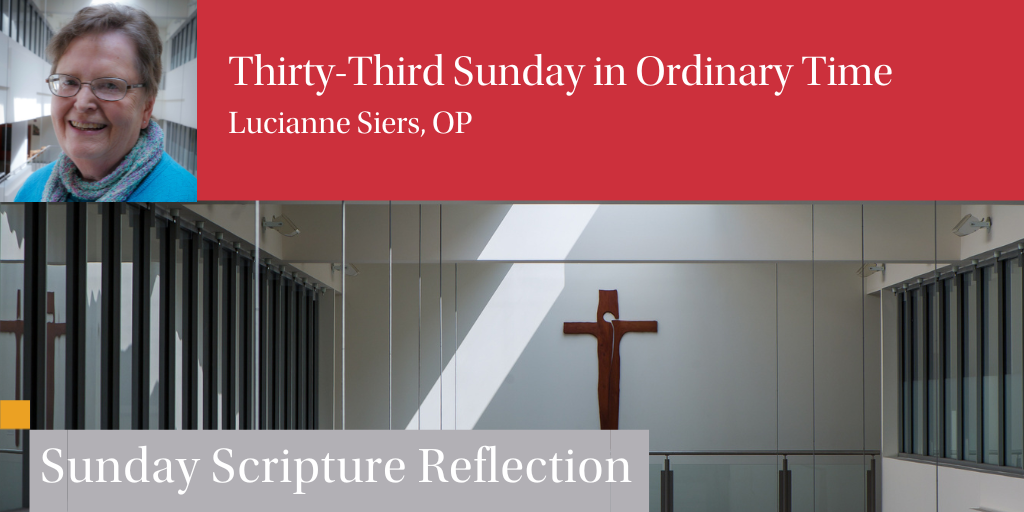
Readings:
Reading I: Mal 3:19-20
Psalm 98:5-6, 7-8, 9
Reading II: 2 Thes 3:7-12
Gospel: Luke 21:5-19
We may find ourselves this week moving closer to the holidays, preparing for plans of get-togethers, purchasing gifts and thinking about delicious foods as we celebrate our time with loved ones.
Amidst this celebration, in the upper mid-west, the colorful trees are losing their leaves and the early darkness in the evening signal that the cold winter is ahead. Even the scripture readings this week have a rather bleak tone to them. They reflect the end of the year but even more so, they reflect the end of the world.
Today, we may feel that the problems of our world could not possibly be mitigated or redeemed. Sometimes the word “Apocalypse” arises in conversations. It can feel like like the end time is coming; the violence, the pandemic, the anger that we have experienced and listened to day after day on the news.
Luke’s Gospel is written for the Gentiles around 80 AD. He offers readers a way to grow and understand the life of Jesus and shares what it means to live the life of a Christian. This Gospel begins with a description of a beautiful temple that is soon destroyed.
Luke relates the tragedy of the fall of Jerusalem in the year 70 AD in detail because during the time in which he writes, new Christians were threatened and killed and the synagogue was a location for persecutions including the death and captivity of women and children. The historian, Josephus, recorded that there was a collapse of the government, two walls of the city of Jerusalem were broken, and he described the city as ravaged by murder, famine and cannibalism.
Rather than the end of the world, Luke describes this terrible tragedy as an end to an era and a time of redemption. Yes, there is suffering, loss of life, and terror, but Luke sees this time as a new beginning. It is time to shift from the pain of destruction and begin anew. This Gospel offers us an alternative to devastating evil. God’s presence saves and reestablishes us and even provides a blueprint for active resistance to these evil powers.
Luke says that the faithful followers of Jesus will suffer terrible agony, but in the midst of their pain, they will be protected. We are told that the disciples will escape without a hair of their head being destroyed. Both humans and nature pass through this difficult time and will be changed anew. He tells the early Christians to enable this time of redemption to dawn by living transformed lives. The suffering endured will act as the purifying fire that provides fulfillment.
For us, Luke’s invites us to be faithful and live the Christian life fully, even through suffering the many losses these recent years. We are asked to hope for a new beginning. We are being invited to find ways to begin a new age by transforming our live, heal our relationships, and rebuild the destruction of what has been destroyed.
As we come near to the end of our calendar year, let us allow our upcoming Advent days to refresh us into greater fullness of God’s loving presence, calling us to begin anew. Luke affirms and encourages us that “not a hair of our head will be destroyed. By your perseverance you will secure your lives.” Luke 21:19
Director of the Institute of Religious Formation and Hesburgh Programs
